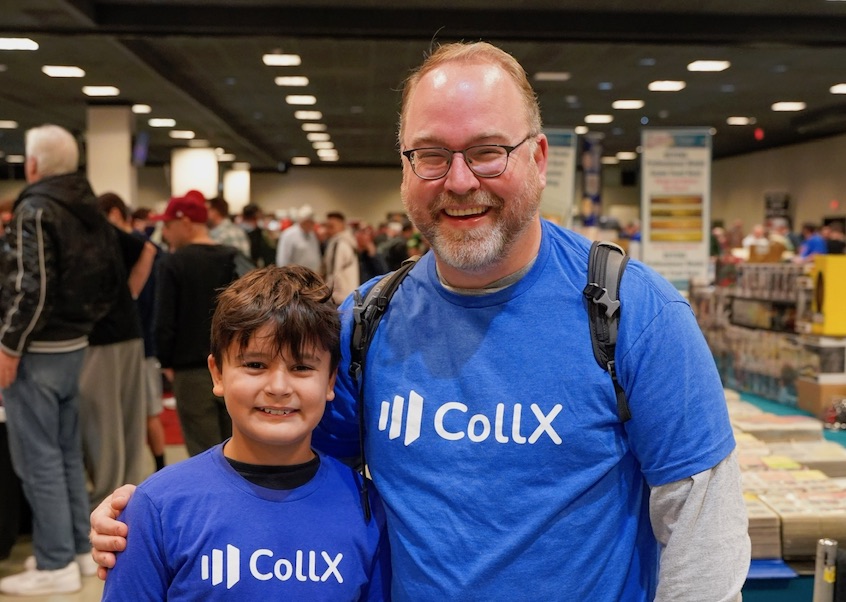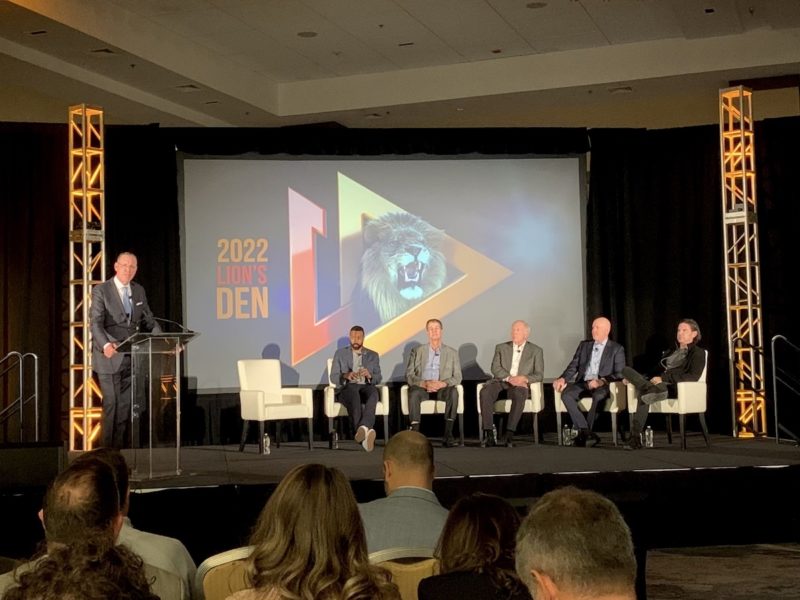As the lights go down in the Philadelphia Marriott Downtown’s ballroom and a panel of top Philly investors grace the stage, a booming voice makes an announcement: It’s time for the Philadelphia Alliance for Capital and Technology (PACT) annual Lion’s Den.
The dramatics are part of the signature style of the event, meant to be a live-action, localized “Shark Tank” for entrepreneurs attending PACT’s annual Capital Conference. It’s usually a nail-biter; three startups that are chosen as most intriguing in their respective categories throughout the daylong conference get a few minutes to pitch for very real cash.
Of the 46 founders who pitched throughout Thursday, three stood before Lion’s Den investors.
The group on stage represented some legacy Philly VC firms and some newer. These funders sat ready for pitches: David Adelman, founder of Darco Capital and CEO of Campus Apartments; Michael DiPiano, managing GP and cofounder of NewSpring Capital; Ira Lubert, cofounder of Independence Capital Partners and partner of LLR Partners; Sylvester Mobley, managing partner of Plain Sight Capital; and John Martinson, chairman of Martinson Ventures.
CollX
Up first was Ted Mann, founder of CollX, a platform to assess the value of trading cards and make sales. The year-old company purchased Card Dealer Pro in June, and has since grown to a 15-person team. The company raised a $1.7 million round this year, though Mann told the lions he was ready to open the round for more investment. CollX is on the verge of launching a paid subscription pro version of its app to its 400,000 users next month, where it’ll start bringing in reliable revenue, Mann said.
The app, developed after Mann’s kids got into trading cards amid the pandemic, brings him back to his first entrepreneurial endeavor, he told the lions — selling sports cards on the playground during recess. But before CollX, he wasn’t necessarily making good deals, he said, instead making deals that were a shot in the dark, like many collectors do today.
“It was solving the problem for myself and now for millions of collectors,” Mann said.

CollX founder Ted Mann with his son, Charlie, who partly inspired the app. (Courtesy photo)
After questions about how the pro version of the app will roll out and what user acquisition marketing will look like (the team is planning a TikTok campaign, the founder said) he laid out the ask: He was looking for $300,000 more as a SAFE note with $10 million value cap.
Three of the lions — Lubert, DiPiano and Adelman — bit for $250,000 total.
HeyKiddo
Up next was Dr. Nicole Lipkin, a psychologist and the founder and CEO of family-focused mental health app HeyKiddo. After hearing from many parents about the struggles they face getting mental healthcare to their young children, Lipkin developed a paid platform that walks parents through support for their kids’ mental, social and emotional health. The app could also function as a B2B business, selling its services to school districts to get parents engaged that way.
“We know that early intervention is absolutely critical and can be the difference between a positive healthy course in life, and a potentially chilling outcome,” Lipkin told the lions.
Lipkin and a team of psychologists and developers had built the platform with two grants from the National Science Foundation. Their Q1 plan is to begin beta testing with a group of more than 1,200 users on a waitlist.
HeyKiddo won the 2022 Globant Prize at the Milken Penn GSE Global Business Plan Competition! Thank you so much to the entire staff at @CatalystPennGSE for recognizing HeyKiddo! pic.twitter.com/NWBzZJNAoH
— HeyKiddo (@HeyKiddoApp) October 13, 2022
Lipkin said she was at the PACT conference to kick off their fundraising journey, with a goal of a $1 million round with a $7 million cap with a 20% discount.
The lions nudged Lipkin on a few factors, including that she still runs a leadership consulting business on the side, and that the round would be going to proof-of-concept work. They also questioned how the app would operate as B2B and B2C, and how it would work toward adherence, or getting long-term engaged users. Ultimately two lions, Lubert and Martinson, said they’d invest $200,000 each if Lipkin would consider lowering her valuation, as they deemed it too high for a company that didn’t have a proof of concept yet.
After some light deliberation, the trio agreed to keep talking.
“It’s an absolute almost yes,” Lipkin said.
ConConnect
Last up to the stage was Andre Peart, a New York City-based, formerly incarcerated “justice tech” entrepreneur who created ConConnect, a platform to help returning citizens find employment. His own experience in prison — which includes being sent back after failing to meet the work and housing requirements, he said — influenced the development of the platform and the partnerships it’s since made. The platform can be used by individuals, organizations and employers to connect previously incarcerated people to jobs, and provide professional development and reentry tools.
The founder just wrapped up Techstars’ social impact accelerator in Atlanta, and said most of his marketing strategy has been cold calling, emailing and word of mouth. The platform has been deployed in 600,000 tablets inside prisons, and the team has sold services to the City of Yonkers and Cox Communications, per Peart.
While many prisons are required to put money and resources into reentry, tech solutions aren’t as common, he said: “They’re not agile enough to figure out what happens after release, and it’s why we’re having great traction.”
Peart’s ask was for the lion’s to help close the company’s $850,000 pre-seed round, of which $525,000 was already committed. The terms of the deal included a $7.5 million cap with a 20% discount. The lions probed about the platform offering employment benefits, and asked if it tracked how successful a formerly incarcerated person is in their eventual role. They also asked about the longevity of a user’s time on the platform, and who might qualify to use it.
Eventually, two lions took the bait.
“I only invest in things where I can add value, and one of my best friends works with the Reform Alliance,” Adelman said, mentioning the justice-minded nonprofit. “I’m in for $100,000.” Lubert matched. Peart, a quiet and measured speaker, shook hands with investors before exiting the stage, where folks lined up to meet with him.
###
Mobley took the stage in lieu of PACT President Dean Miller, where he gave props to the more than 40 entrepreneurs who pitched Thursday.
“Anyone who’s had to pitch before knows how difficult it is,” Mobley said. “I don’t want that to be lost on those who just pitched.”
Now in the event’s eighth year, Lion’s Den investors have made more than $10 million in on-the-spot investments. In the 2021 edition, Hale Therapeutics, Naturaz and Fulton all got funding.
Before you go...
To keep our site paywall-free, we’re launching a campaign to raise $25,000 by the end of the year. We believe information about entrepreneurs and tech should be accessible to everyone and your support helps make that happen, because journalism costs money.
Can we count on you? Your contribution to the Technical.ly Journalism Fund is tax-deductible.
Join our growing Slack community
Join 5,000 tech professionals and entrepreneurs in our community Slack today!

The person charged in the UnitedHealthcare CEO shooting had a ton of tech connections

The looming TikTok ban doesn’t strike financial fear into the hearts of creators — it’s community they’re worried about

Where are the country’s most vibrant tech and startup communities?


